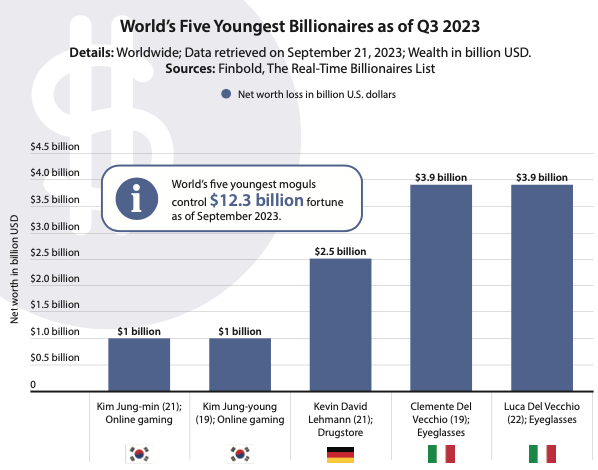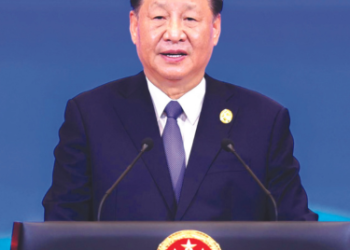
In an era where youthfulness and innovation are highly prized, a new breed of business tycoons has emerged globally. These individuals, barely into their 20s, have harnessed their entrepreneurial acumen, cutting-edge ideas, and support systems to amass a staggering fortune.
Particularly, data acquired by Finbold indicates that as of Q3 2023, the world’s five youngest billionaires collectively control a staggering $12.3 billion in wealth as of September 21. At 22, Italy’s Luca Del Vecchio, a prominent figure in the eyeglasses industry, with links to the Luxottica Group leads the pack with a fortune valued at $3.9 billion. He owns eyewear brands like Armani Exchange, Burberry and Dolce. His brother, Clemente Del Vecchio, also active in the same industry, has amassed a wealth of $3.9 billion at the age of 19.
In third place is Germany’s Kevin David Lehmann, aged 21, who has made a mark in the drugstore industry, boasting a net worth of $2.5 billion. Lehman acquired his fortune through a stake in Germany’s leading drugstore chain, DM (Drogerie Markt).
Elsewhere, South Korea’s Kim Jung-youn, at 19 years old, secures the fourth position with an impressive fortune of $1 billion. Occupying the fifth spot is Kim Jung-min, aged 21, who shares a valuation of $1 billion with her compatriot. These South Korean siblings have accrued their wealth through their stake in the online gaming giant Nexon (NXC), founded by their late father, Kim Jung-Ju.
How the young billionaires are making money
In a world that traditionally celebrated older, more experienced business leaders, the ascent of these five young moguls marks a significant shift in the dynamics of wealth accumulation. Their ability to disrupt industries, adapt to rapidly changing markets, and seize opportunities has elevated them into the top positions of global wealth.
While these five billionaires represent diverse industries, one common thread emerges: most have accrued their wealth through pre-existing family connections, exemplified by the Vecchio brothers. Family-owned enterprises often entrust key leadership roles to close relatives, capitalizing on the trust and familiarity within the family circle. Alternatively, they may possess considerable wealth, enabling them to offer significant financial backing for their children to initiate their enterprises.
Nevertheless, these dynamics aren’t limited solely to direct family ties. Even individuals linked to affluent families through friendships or acquaintances can benefit from these associations. These billionaires have forged their fortunes through innovation and relentless effort rather than relying solely on inherited wealth.
This entrepreneurial drive frequently motivates them to channel their resources into enterprises or burgeoning startups through direct investmentsor private equity funds. Many youthful rich people engage directly with startups or funnel their investments through private equity vehicles. This strategic approach enables them to champion innovation and positions them to harvest significant returns should a startup achieve remarkable success.
Leading young billionaires concentrated in Europe and Asia
Based on the data, it’s evident that the top five young billionaires originate from Europe and Asia. These regions have notably undergone substantial economic growth in recent decades, creating new industries and opportunities that provide fertile ground for entrepreneurial endeavors.
Notably, these regions are also characterized by technological innovation, which fuels the entrepreneurial spirit, and are complemented by large and diverse consumer markets. This combination allows businesses in sectors like luxury fashion and technology to rapidly scale and tap into a broad customer base. Moreover, the success of these young billionaires can be attributed in part to cultural factors. Specifically, in certain countries, there is a pronounced emphasis on entrepreneurship and academic achievement. These cultural attributes, including a willingness to take risks and a strong work ethic, contribute significantly to the achievements of young entrepreneurs.
Criticism of billionaires
The highlighted billionaires are also facing the inherent issues of taxation that have faced their older counterparts. Critics argue that some wealthy individuals benefit from tax loopholes and lower capital gains rates, allowing them to pay a smaller percentage of their income in taxes than the average citizen. While some young billionaires engage in philanthropic efforts to address wealth inequality, the discussion about tax reform and wealth redistribution remains central to this ongoing debate. Further criticisms center on the societal consequences of the rapid rise of young billionaires, spanning employment, wealth distribution, and responsible wealth management. Critics raise concerns about their impact on global unemployment, as they may not create jobs proportionate to their immense wealth and can rely on job-displacing practices like automation. The concentration of vast wealth among these individuals also fuels worries about wealth inequality, limiting access to essential services and opportunities for others. Additionally, there are doubts about their experience and accountability, given their young age and rapid wealth acquisition, potentially leading to irresponsible financial behavior.






